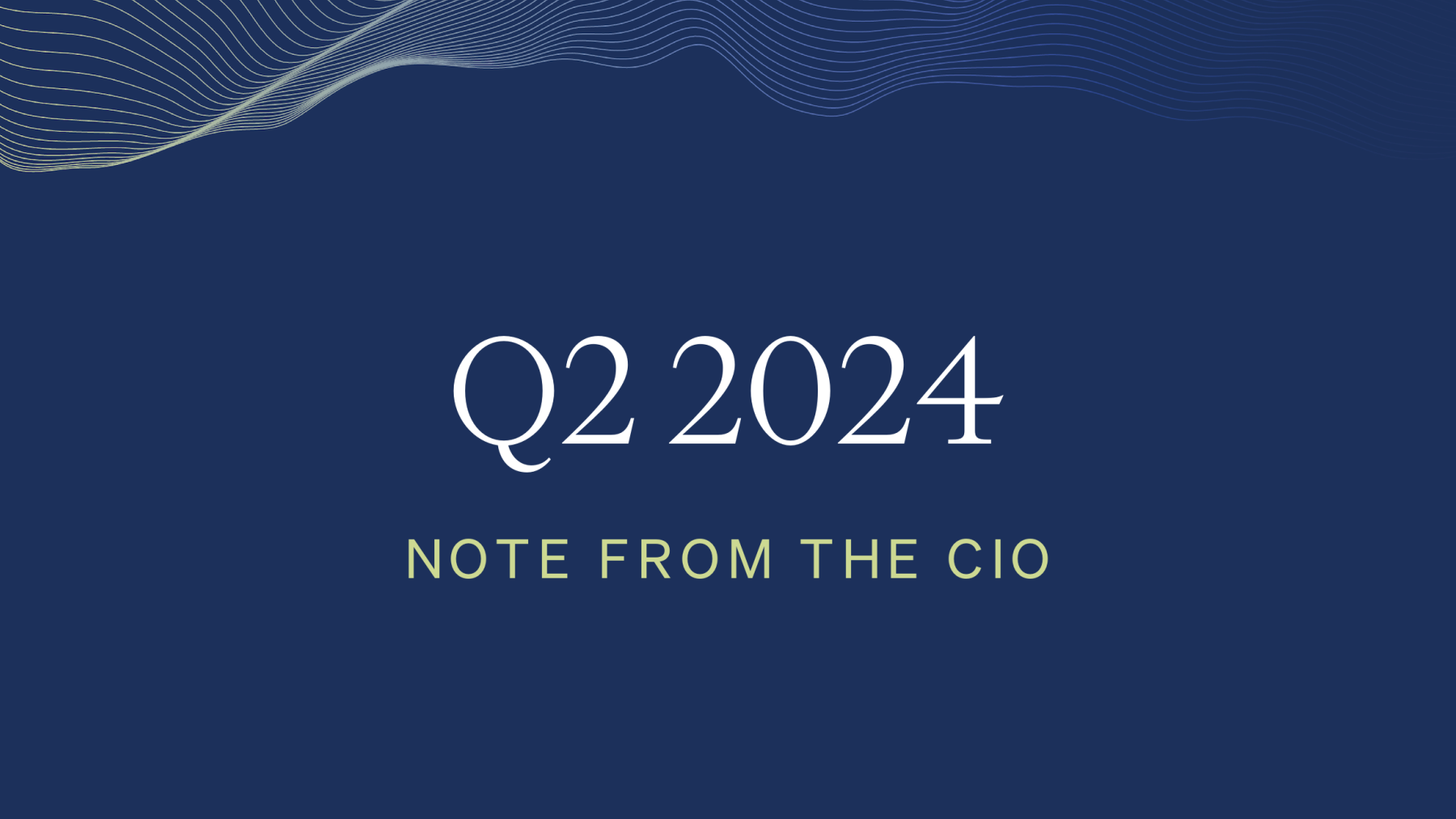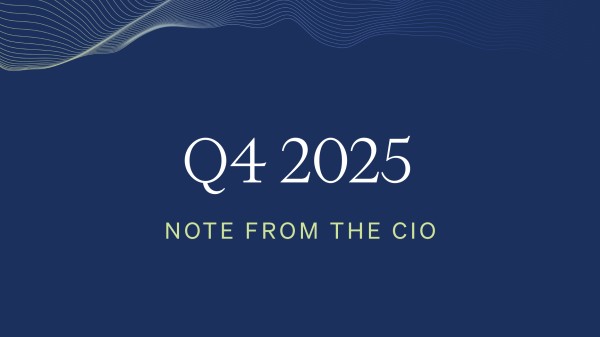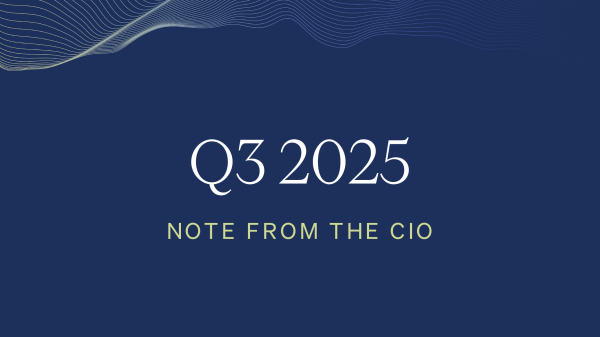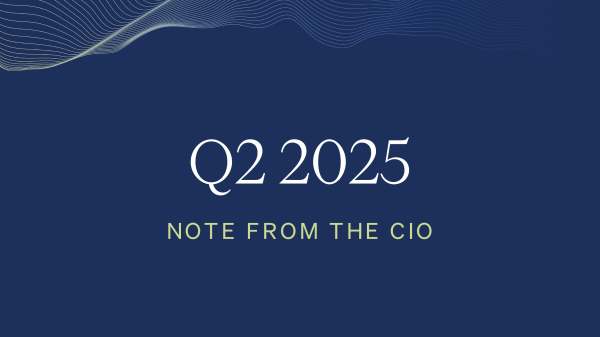Tune Out the Noise
- Note from the CIO
- Investment Management

As we reflect on the first half of 2024, it's clear that our commitment to disciplined, long-term equity investing has once again proven its worth. At Quantum, we remain resolute in our belief that attempting to predict the unpredictable—whether it's the economy or market fluctuations—is a futile endeavor. Instead, we adhere to a proactive strategy anchored in goals and planning, steering clear of reactionary moves driven by fleeting trends or sensational headlines.
The year unfolded against a backdrop where familiar themes from 2023 persisted. The Federal Reserve maintained its key interest rate amid stable inflation levels, while U.S. equities reached new heights on the back of robust corporate earnings, particularly within the technology sector.
Since the Fed's last rate hike1 in July 2023 to 5.25%, inflation has consistently hovered around the 3% mark2 , despite the central bank's efforts to rein in price increases to its 2% target. Meanwhile, the S&P 500, comprising America's top 500 companies, posted an above-average 15.3% return in the first half of 2024, reinforcing the market's resilience and vitality3 .
Some may question the implications of these new market highs. However, consider this: the S&P 500 closed the first half of 2024 at 5,460. Rewind three decades to mid-1994, and the index stood at a mere 460—an almost twelvefold increase. Such growth underscores the fundamental dynamics of a competitive market where companies strive to innovate and deliver value, consistently pushing indices to new peaks. Simply stated, new highs are a feature, not a bug.
International markets also saw solid returns4 , albeit trailing their American counterparts. Companies in the developed and emerging markets returned 5.4% and 10.8%, respectively. It is natural to ask what is driving the higher performance in the US.
Taking a closer look at the performance of the S&P 500, we observe that two thirds of the return was bolstered by a select group of companies, better known as the "Magnificent 7," which is comprised of giants like Alphabet, Amazon, and Apple—which collectively outperformed the broader index by a wide margin5 .
History reminds us however, that such dominance by a few mega-cap companies is cyclical. Market leadership evolves, highlighting the importance of diversification to capture future opportunities. At Quantum, we remain committed to maintaining a balanced approach that ensures our portfolios are well-positioned for whatever the future may hold.
Looking ahead, our optimism is grounded in the enduring strength of earnings—the ultimate driver of long-term value in our diversified portfolio of successful companies. Despite potential challenges such as typical market corrections, which historically occur with regularity, we remain steadfast in our strategy of weathering historically temporary but often significant declines.
By focusing on the foundational merits of our investments—accelerating earnings growth and innovative business models—we tune out the noise and mitigate the risk of emotional reactions to market volatility.
We stand by our plan with confidence and enthusiasm for what lies ahead.
- The federal funds rate is the overnight interest rate at which banks lend to each other some of their funds that are held at the Federal Reserve. ↩
- Inflation data is defined by the Consumer Price Index (CPI) from the US Bureau of Labor Statistics; the “Consumer Price Index for All Urban Consumers: All Items” is an aggregate of prices paid by urban consumers for a typical basket of goods. ↩
- This includes dividends and it excludes all fees and taxes. ↩
- Developed international companies and emerging markets companies are represented by the MSCI World ex USA Index (gross div.) and the MSCI Emerging Markets Index (gross div.), respectively. ↩
- The seven companies are Alphabet, Amazon, Apple, Meta, Microsoft, Nvidia, and Tesla. Return data is courtesy of the JP Morgan Guide to the Markets, 3Q 2024. ↩
DISCLOSURE: Quantum Financial Advisors, LLC is an SEC registered investment adviser. SEC registration does not constitute an endorsement of Quantum Financial Advisors, LLC by the SEC nor does it indicate that Quantum Financial Advisors, LLC has attained a particular level of skill or ability. This material prepared by Quantum Financial Advisors, LLC is for informational purposes only and is accurate as of the date it was prepared. It is not intended to serve as a substitute for personalized investment advice or as a recommendation or solicitation of any particular security, strategy or investment product. Advisory services are only offered to clients or prospective clients where Quantum Financial Advisors, LLC and its representatives are properly licensed or exempt from licensure. No advice may be rendered by Quantum Financial Advisors, LLC unless a client service agreement is in place. This material is not intended to serve as personalized tax, legal, and/or investment advice since the availability and effectiveness of any strategy is dependent upon your individual facts and circumstances. Quantum Financial Advisors, LLC is not an accounting or legal firm. Please consult with your tax and/or legal professional regarding your specific tax and/or legal situation when determining if any of the mentioned strategies are right for you.
Please Note: Quantum does not make any representations or warranties as to the accuracy, timeliness, suitability, and completeness, or relevance of any information prepared by an unaffiliated third party, whether linked to Quantum’s website or blog or incorporated herein, and takes no responsibility for any such content. All such information is provided solely for convenience purposes only and all users thereof should be guided accordingly.
For more information about Quantum and this article, please read these important disclosures.
- Note from the CIO
- Investment Management
Darius Gagne, PhD, CFP®, CFA
Darius Gagne is the Chief Investment Officer of Quantum Financial Advisors, LLC. Darius is also a Financial Advisor directly to clients and a founding partner of the firm.
Read More









